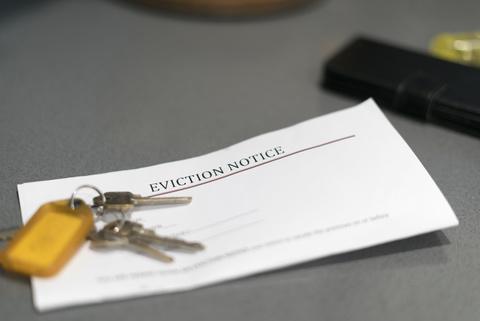Housing Secretary Robert Jenrick has extended the eviction ban for renters again.
The ban on bailiffs attending to enforce a possession order which was set to run out on February 22 will last until 31 March 2021 at the earliest in England.
The ban is subject to a review around March 24 and could be extended again.
Housing charity Shelter claims 445,000 tenants have missed rent payments during the pandemic.
Contents
Tenants in financial difficulties
Most are struggling with their finances due to losing their job or a dip in wages due to the impact of successive lengthy lockdowns.
There are exceptions where enforcement can continue, including:
- Rent arrears of more than six months
- Anti-social behaviour
- Illegal occupation of a home
- Fraud
The number of eviction cases before the courts has shrunk due to the ban.
Ban sees evictions drop by 93%
Applications to repossess homes were doe 67% in the three months to December 2020, compared with a year earlier.
Evictions dropped by 93% to just 548 between April and the end of the year, against 22,400 in the same period of 2019.
The figures include data for private and social landlords.
“We have taken unprecedented action to support renters during the pandemic including introducing a six-month notice period and financial support to help those struggling to pay their rent,” said Mr Jenrick.
“By extending the ban on the enforcement of evictions by bailiffs, in all but the most serious cases, we are ensuring renters remain protected during this difficult time.
“Our measures strike the right balance between protecting tenants and enabling landlords to exercise their right to justice.”
Eviction Ban FAQ
The ban has seen landlord evictions through the courts almost grind to a halt as the government strives to keep renters in their homes during the COVID-19 pandemic.
The complicated rules and timescales are confusing for landlords and tenants, so here are some answers to the most asked questions about serving possession notices and acting through the courts.
Where can I find official eviction ban guidance?
An in-depth guide published by the Ministry of Housing called Technical guidance on eviction notices was last revised on January 8.
Another guide Understanding the possession action process: A guide for private landlords in England and Wales was updated on January 11.
Links to earlier editions of both documents are available online, so check you have the latest update from the government web site.
The evidence pack a landlord puts before the court must include a statement about how the tenant’s financial status has been affected by the coronavirus pandemic.
The statement should explain if a tenant is in arrears because they have lost their job or are on furlough.
Don’t forget any efforts to agree a private arrangement to defer and repay rent should be covered as well. It’s a good idea to have these conversations in writing and countersigned as correct by the tenant.
If the arrears are not attributed to COVID-19, highlight this as well.
When can a possession case go before a court?
The courts started hearing possession applications in September, with the most serious heading the list.
Thousands of less serious cases could wait a year to go before a judge.
When can I serve a Section 21 notice?
Landlords must wait four months after the start of a tenancy to serve a Section 21 notice.
More information
We have various sources of related information:




